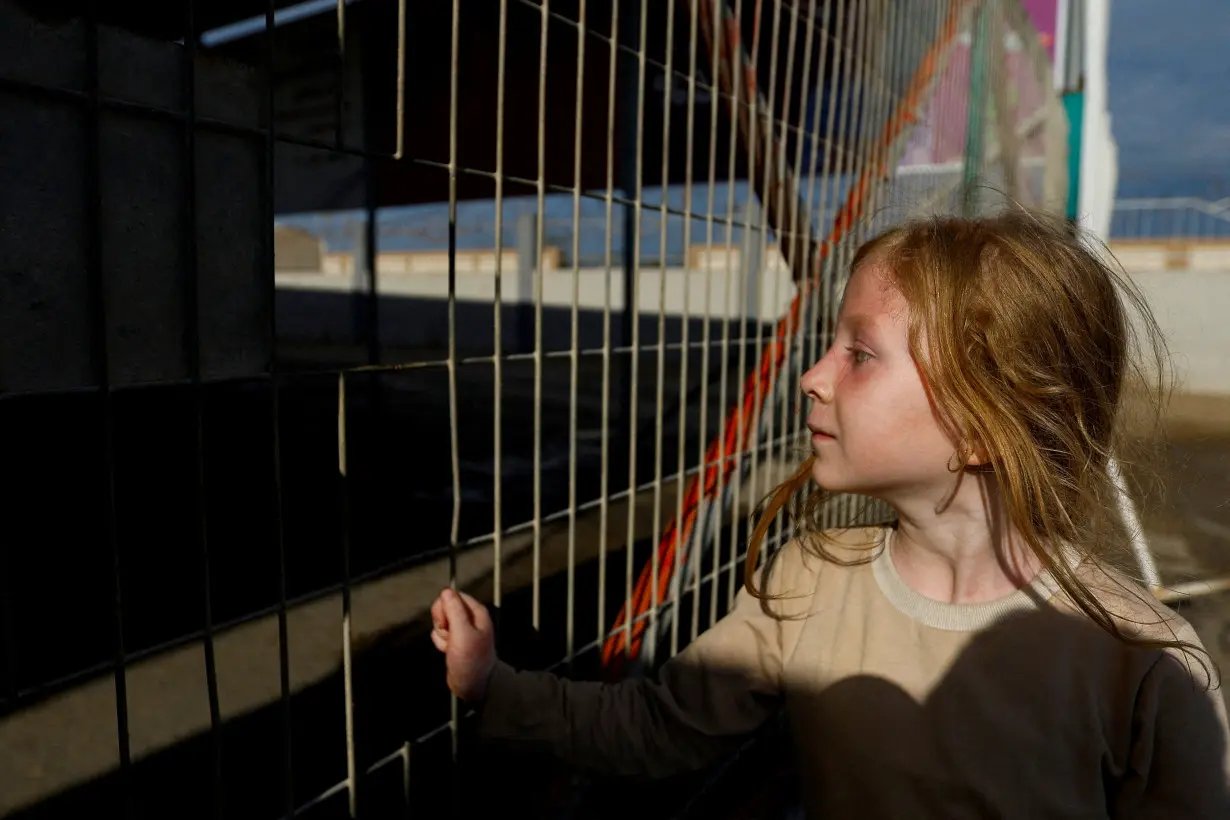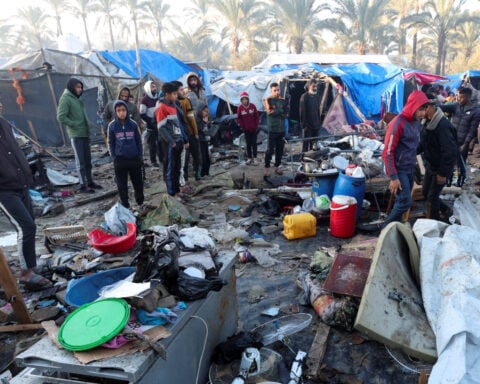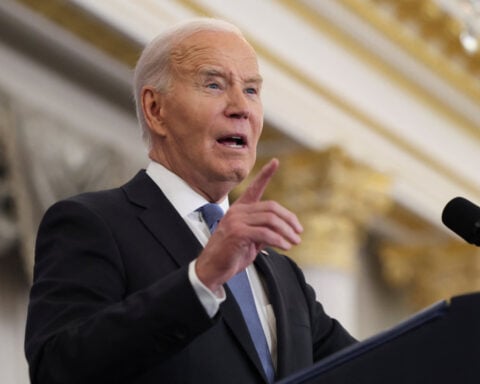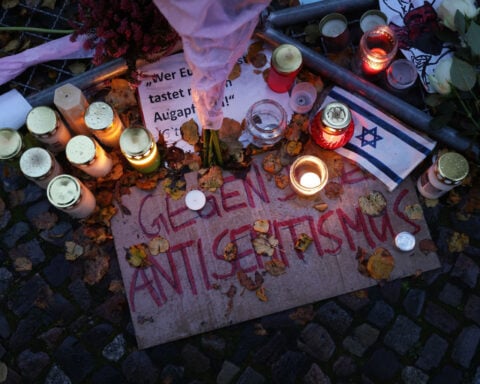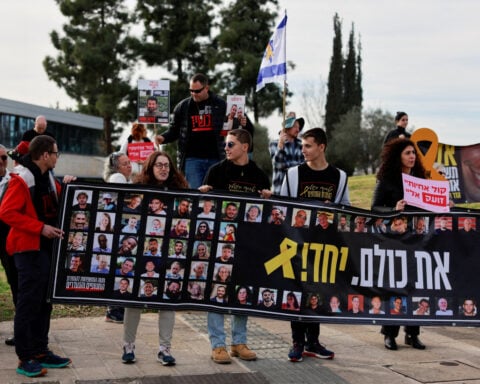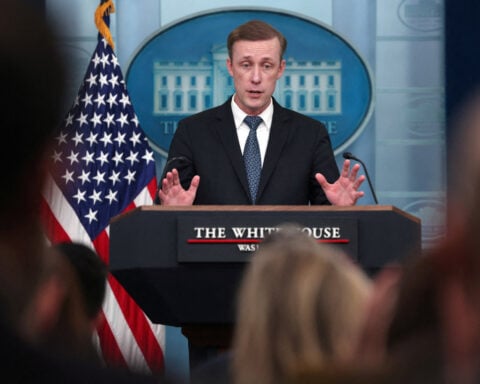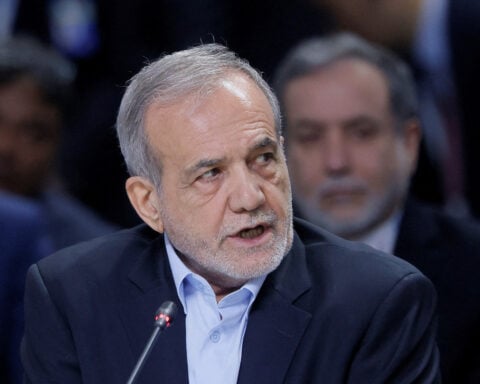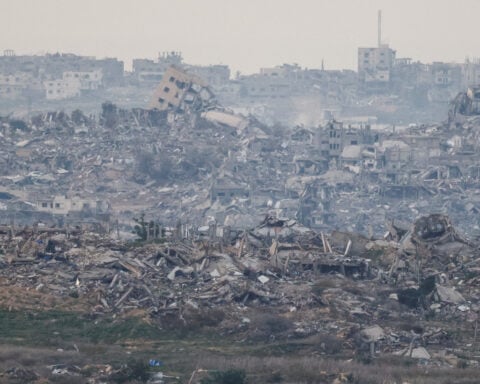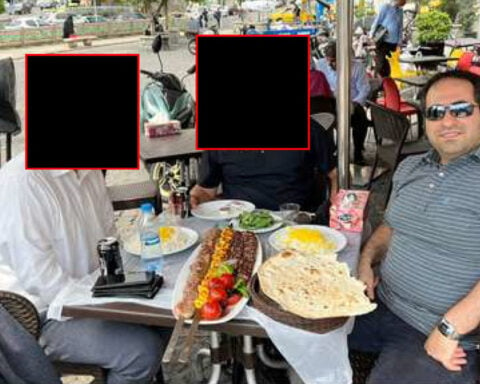(Reuters) - The Rafah crossing between the Gaza Strip and Egypt is the sole route for aid to enter Gaza directly from outside Israel and the only exit that does not lead to Israeli territory.
It has become a focus of the conflict between Israel and the Palestinian militant group Hamas as a humanitarian crisis unfolds and hundreds of thousands of Palestinians head to south Gaza from the enclave's north to escape Israeli bombing.
More than 100 trucks were waiting close to the Rafah crossing on the Egyptian side on Thursday, though it was not expected that aid would enter before Friday, Egyptian security sources said.
More aid is being held in the Egyptian city of Al Arish, about 45 km (28 miles) from Rafah. Egypt has said it did not close the crossing but Israeli bombardments had made it inoperable.
After U.S. President Joe Biden talked with Egyptian President Abdel Fattah El-Sisi on Wednesday, the United States said Egypt had agreed to allow aid to reach Palestinians through the crossing.
WHERE IS THE RAFAH CROSSING AND WHO CONTROLS IT?
The crossing is at the south of the Gaza Strip, a narrow slither of land that is home to 2.3 million people and wedged between Israel, Egypt and the Mediterranean Sea. It is controlled by Egypt.
WHAT HAS BEEN AGREED ON AID PASSAGE?
Biden told reporters that about 20 trucks carrying humanitarian aid would be allowed into the enclave. He did not give a timeline but a U.S. spokesperson said it would occur in coming days following repairs to the road.
Before the current violence erupted on Oct. 7, about 100 trucks carrying aid would enter each day, according to the United Nations.
Sisi also said: "What is happening now in Gaza is an attempt to force civilian residents to take refugee and migrate to Egypt, which should not be accepted."
WHY IS THE RAFAH CROSSING SO IMPORTANT IN THIS CONFLICT?
In response to a cross-border infiltration by Hamas fighters on Oct. 7 that killed more than 1,400 Israelis, Israel has imposed a total blockade of Gaza, cutting off electricity and stopping all supplies of food and fuel. About 3,500 Palestinians have been killed, according to Gaza health authorities.
The blockade means the only likely route for humanitarian aid to enter Gaza is via Rafah from Egypt's Sinai region. It is also the only exit point for Gaza residents seeking to flee.
Foreign passport holders, including Americans, have headed to the vicinity hoping to be allowed out under any deal, although Cairo has said aid must be delivered first.
Israel has called on Gazans to move southwards closer to Rafah to shelter from bombardment, although residents say they cannot find safety anywhere in the crowded enclave.
WHY IS ACCESS ACROSS RAFAH RESTRICTED?
Egypt is wary of insecurity near the border with Gaza in northeastern Sinai, where it faced an Islamist insurgency that peaked after 2013 and has now largely been suppressed.
Since Hamas took control in Gaza in 2007, Egypt has helped enforce a blockade of the enclave and heavily restricted the flow of people and goods. Like the main crossings with Israel, restrictions have sometimes been eased but not lifted, and travellers need security clearance and lengthy checks to pass.
In 2008, tens of thousands of Palestinians crossed into Sinai after Hamas blasted holes in border fortifications, prompting Egypt to build a stone and cement wall.
Egypt has acted as a mediator between Israel and Palestinian factions during past conflicts and periods of unrest. But in those situations it has also locked down the border, allowing aid to enter and medical evacuees to leave but preventing any large-scale movement of people.
Even as Israel pursues its heaviest ever bombardment of Gaza in response to the Hamas assault, Egypt has shown no sign so far that its approach will change.
WHAT EFFORTS ARE BEING MADE TO OPEN THE BORDER?
The United Nations has urged Israel to avert a "humanitarian catastrophe" in Gaza, warning that food, fuel and even drinking water supplies are running dangerously low.
Hospitals say they are struggling to cope with the wounded as back-up generators run low on fuel.
U.S. Secretary of State Antony Blinken said on Tuesday the United States and Israel had agreed to develop a plan to get humanitarian aid to civilians in Gaza without benefiting Hamas.
WHY ARE ARAB STATES SO RELUCTANT TO TAKE IN PALESTINIANS?
Arab countries have deep-rooted fears that Israel's latest war with Hamas in Gaza could spark a new wave of permanent displacement from land where Palestinians hope to build a state.
Egypt, the only Arab state to share a border with Gaza, and Jordan, which flanks the Israeli-occupied West Bank, have both warned against Palestinians being forced off their land.
President Sisi has said it is vital that Palestinians "remain steadfast and present on their land," while Jordan's King Abdullah warned against "any attempt to forcibly displace Palestinians from all Palestinian territories or cause their internal displacement".
For Arabs and Palestinians, the idea of leaving or being driven out of territory where they want to forge a state carries echoes of the "Nakba", or "catastrophe", when many Palestinians fled or were forced from their homes during the 1948 war that accompanied Israel's creation.
Israel contests the assertion it drove Palestinians out, saying it was attacked by five Arab states after its creation.
Some 700,000 Palestinians, half the Arab population of what was British-ruled Palestine, were dispossessed and displaced, many spilling into neighbouring Arab states where they and their descendants remain. Many still live in refugee camps.
As a result, many Palestinians say they do not want to leave Gaza - from which Israel withdrew in 2005 after a 38-year occupation - even as this latest conflict has escalated.
(Writing by Aidan Lewis and Edmund Blair; editing by Mark Heinrich and Angus MacSwan)

 Stock market today: Asian stocks mixed ahead of US inflation data
Stock market today: Asian stocks mixed ahead of US inflation data
 TikTok seeks to reassure U.S. employees ahead of Jan. 19 ban deadline
TikTok seeks to reassure U.S. employees ahead of Jan. 19 ban deadline
 US won't seek charges in unarmed Black motorist Ronald Greene's fatal 2019 arrest
US won't seek charges in unarmed Black motorist Ronald Greene's fatal 2019 arrest
 Euro zone households could increase consumption, ECB chief economist says
Euro zone households could increase consumption, ECB chief economist says
 Foreigners sold South Korean equities last month by most since early 2020
Foreigners sold South Korean equities last month by most since early 2020
 As fires ravage Los Angeles, Tiger Woods isn't sure what will happen with Riviera tournament
As fires ravage Los Angeles, Tiger Woods isn't sure what will happen with Riviera tournament
 Antetokounmpo gets 50th career triple-double as Bucks win 130-115 to end Kings' 7-game win streak
Antetokounmpo gets 50th career triple-double as Bucks win 130-115 to end Kings' 7-game win streak
 No 97 Laura Siegemund upsets Olympic champion Zheng Qinwen at the Australian Open
No 97 Laura Siegemund upsets Olympic champion Zheng Qinwen at the Australian Open
